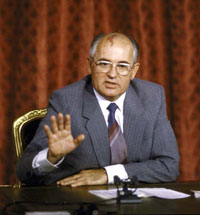Mikhail Gorbachev says USA makes major strategic mistakes
Former Soviet leader Mikhail Gorbachev on Friday laid the blame for the current low in Russia's relations with the West squarely at Washington's door, accusing the United States of making "major strategic mistakes" that had thrown the world into a period of "global disarray."

Russia has fallen out with the United States on a raft of issues, clouding relations and leading some commentators to draw parallels with the Cold War.
Gorbachev expressed strong support for President Vladimir Putin's stance on most questions, and traced the roots of the chill with the West to the collapse of the Soviet Union, which, he said, put Washington in an empire-building mood.
After the Soviet Union's collapse, "the idea of a new empire, of sole leadership, was born," he said at a news conference. "Unilateral actions and wars followed," he added, saying that Washington "ignored the Security Council, international law and the will of their own people."
"These are major strategic mistakes," Gorbachev said.
Gorbachev, whose liberal policies of glasnost and perestroika - openness and restructuring - set in play democratic forces that led to the collapse of the Soviet Union, echoed Putin's frequent endorsement of a so-called "multipolar world," or one without the perceived dominance of the United States.
"No one, no single center, can today command the world. No single group of countries, like the G-8, can do it," Gorbachev said. "There is no option other than to build a multipolar world order, no matter how complicated this is."
That, he said, would not be achieved until the Bush administration had departed.
"Under the current U.S. president I don't think we can fundamentally change the situation as it is developing now," he said. "It is dangerous. The world is experiencing a period of growing global disarray."
The Kremlin says the Bush administration's plans for a missile defense system in Eastern Europe could spark a new arms race. It has refused to back Washington's draft Security Council resolution on Kosovo's independence and has suspended its participation in a key treaty on arms reduction in Europe.
Moscow is also in the midst of a bitter diplomatic squabble with Britain over Russia's refusal to extradite a suspect in the polonium killing of former KGB agent Alexander Litvinenko, which has seen a tit-fot-tat expulsion of diplomats.
Addressing the diplomatic dispute with Britain, Gorbachev called for calm. "What's done is done - we need to stop and return to a dialogue and continue developing ties," he said.
Still, he said the case was "politicized" and, therefore, "someone needs it to be so, and to spoil relations." He said Britain "tries to be a good friend only for the United States."
While conceding that there had been some rollbacks in media freedoms under Putin, Gorbachev said his policies were in the "interests of the majority" and stressed that Russia was in a "transitional period."
With presidential elections slated for next year, speculation is rife over who will succeed Putin and what role he will play outside the Kremlin.
Gorbachev pitched in: "I am sure President Putin will find his place in future life. And this place will be a serious one. It will become clear very soon," he said.
Subscribe to Pravda.Ru Telegram channel, Facebook, RSS!


